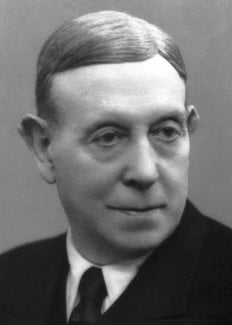Egas Moniz
Biographical

(António Caetano de Abreu Freire) Egas Moniz was born in Avanca, Portugal, on November 29, 1874, the son of Fernando de Pina Rezende Abreu and Maria do Rosário de Almeida e Sousa. He received his early education from his uncle Abbé Caetano de Pina Rezende Abreu Sa Freire, before joining the Faculty of Medicine at Coimbra University. He received further education at Bordeaux and Paris and became Professor at Coimbra in 1902. In 1911 he transferred to the new Chair in Neurology at Lisbon where he remained until his death. He also worked for a time as a physician in the Hospital of Santa Maria, Lisbon.
Moniz entered politics in 1903 and served as a Deputy in the Portuguese Parliament until 1917 when he became Portuguese Ambassador to Spain. Later in 1917 he was appointed Minister for Foreign Affairs and he was President of the Portuguese Delegation at the Paris Peace Conference in 1918.
Moniz discovered cerebral angiography and prefrontal leucotomy and the extent of his work is perhaps best indicated by listing his more important publications:
Alterações anátomo-patológicas na difteria (Anatomo-pathologic changes in diphtheria), Coimbra, 1900.
A vida sexual (fisiologia e patologia) (Physiological and pathological aspects of sex life), 19 editions, Coimbra, 1901.
A neurologia na guerra (Neurology in war), Lisbon, 1917.
Um ano de política (A year of politics), Lisbon, 1920.
Júlio Diniz e a sua obra (Julio Denis and his works), 6 editions, Lisbon, 1924.
O Padre Faria na história do hipnotismo (Abbé Faria in the history of hypnotism), Lisbon, 1925.
Diagnostic des tumeurs cérébrales et épreuve de l’encéphalographie artérielle (Diagnostics of cerebral tumours and application of arterial encephalography), Paris, 1931.
L’angiographie cérébrale, ses applications et résultats en anatomic, physiologie te clinique (Cerebral angiography, its applications and results in anatomy, physiology, and clinic), Paris, 1934.
Tentatives opératoires dans le traitement de certaines psychoses (Tentative methods in the treatment of certain psychoses), Paris, 1936.
La leucotomie préfrontale. Traitement chirurgical de certaines psychoses (Prefrontal leucotomy. Surgical treatment of certain psychoses), Turin, 1937.
Clinica dell’angiografia cerebrale (Clinical cerebral angiography), Turin, 1938.
Die cerebrale Arteriographie und Phlebographie (Cerebral arteriography and phlebography), Berlin, 1940.
Ao lado da medicina (On the side of medicine), Lisbon, 1940.
Trombosis y otras obstrucciones de las carótidas (Thrombosis and other obstructions of the carotids), Barcelona, 1941.
História das cartas de jogar (History of playing-cards), Lisbon, 1942.
Como cheguei a realizar a leucotomia pré-frontal (How I came to perform leucotomy), Lisbon, 1948.
Die präfrontale Leukotomie (Prefrontal leucotomy), Archiv für Psychiatrie und Nervenkrankheiten, 1949.
Moniz received the Gran-Cruz da Instrução e Benemerência (Portugal) and the Gran-Cruz de Izabella Catolica (Spain): he was appointed Grand Officier de la Couronne d’Italie, and Commandeur de la Légion d’Honneur (France). He was Doctor, honoris causa, of the Universities of Bordeaux and Lyon; Membre de Mérite, and President at various times, of the Academy of Sciences, Lisbon; Member of the Academy of Medicine, Paris; of the Academy of Medicine, Madrid; of the Society of British Neurological Surgeons; Honorary Member of the Royal Society of Medicine, London; of the Académie Nationale de Médecine de Rio de Janeiro; of the American Society of Neurology; and of several South American institutions among many others.
Prof. Moniz married Elvira de Macedo Dias in 1902; he died in 1955.
This autobiography/biography was written at the time of the award and first published in the book series Les Prix Nobel. It was later edited and republished in Nobel Lectures. To cite this document, always state the source as shown above.
Egas Moniz died on December 13, 1955.
Nobel Prizes and laureates
Six prizes were awarded for achievements that have conferred the greatest benefit to humankind. The 14 laureates' work and discoveries range from quantum tunnelling to promoting democratic rights.
See them all presented here.
